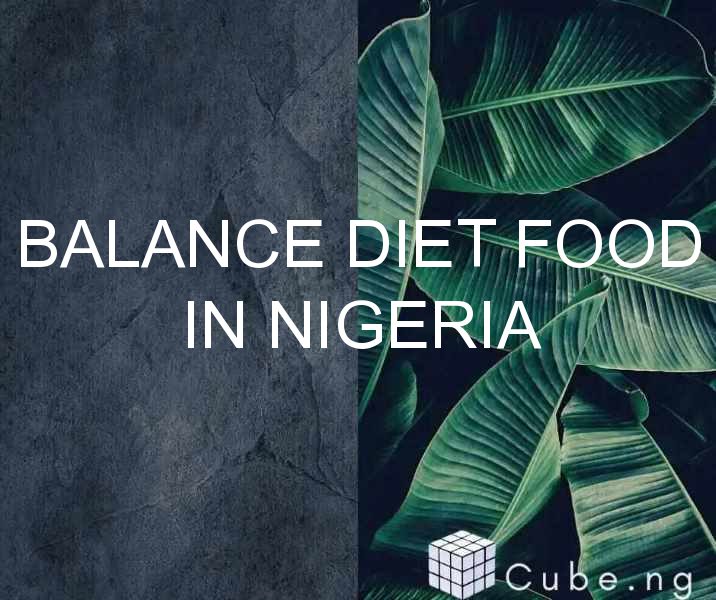Balance Diet Food in Nigeria: A Comprehensive Guide
Nutrition plays a vital role in maintaining good health and well-being. A balanced diet, with all the necessary nutrients, is crucial for a healthy and active lifestyle. In Nigeria, traditional foods and modern cuisine offer a diverse range of options for a balanced diet. This comprehensive guide will provide insight into the best options for a balanced diet in Nigeria.
What is a Balanced Diet?
A balanced diet includes all the necessary nutrients, such as carbohydrates, proteins, fats, minerals, and vitamins, in the right proportions. These nutrients help in maintaining good health, building immunity, and preventing diseases. A balanced diet should include a variety of foods in different proportions, depending on an individual's age, gender, and activity level.
Carbohydrates: The Energy Source
Carbohydrates are a vital source of energy and should constitute about 50-60% of your daily calorie intake. They are found in foods like rice, plantain, yam, cassava, bread, and pasta. Traditional Nigerian foods like eba, fufu, and amala are also good sources of carbohydrates. It is essential to choose complex carbohydrates over simple carbohydrates, as complex carbohydrates take longer to digest, providing sustained energy.
Proteins: Building Blocks of Life
Proteins are the building blocks of life, and the body uses them to build and repair tissues. They should constitute about 15-20% of your daily calorie intake. Nigerian foods rich in protein include beans, soybeans, groundnuts, fish, meat, and poultry. Vegetarians can opt for plant-based sources like soybeans, chickpeas, lentils, and nuts.
Fats: Essential for Absorption
Fats are essential for the absorption of fat-soluble vitamins and provide energy. They should not constitute more than 30% of your daily calorie intake. Healthy sources of fats include nuts, seeds, avocado, olive oil, and coconut oil. Unhealthy fats like trans fat and saturated fat should be avoided as they increase the risk of heart disease.
Fruits and Vegetables: Packed with Nutrients
Fruits and vegetables are packed with essential nutrients like vitamins, minerals, and fiber. They should be included in every meal and constitute about 25% of your daily calorie intake. Nigerian fruits and vegetables like watermelon, mangoes, oranges, pawpaw, spinach, ugu, and ewedu are excellent sources of nutrients.
Dairy Products: Rich in Calcium
Dairy products like milk, cheese, and yogurt are rich in calcium, which is essential for strong bones and teeth. They should be included in moderate amounts in a balanced diet. Nigerian dairy products like local cheese (wara), yogurt (nono), and milk (fura) are good options.
Water: Stay Hydrated
Water is essential for staying hydrated and regulating body temperature. It is recommended to drink at least 8-10 glasses of water a day. Nigerian drinks like zobo, kunu, and coconut water are also good options for staying hydrated.
Healthy Nigerian Meal Plan
A healthy Nigerian meal plan should include a variety of foods in the right proportions. Here's a sample meal plan for a day:
Breakfast: Boiled yam and egg sauce, or oatmeal with milk and banana.
Snack: A handful of nuts or a piece of fruit.
Lunch: Jollof rice with grilled chicken and vegetables, or beans and plantain porridge.
Snack: Sliced cucumber and carrots with hummus.
Dinner: Vegetable soup with fufu or eba, or grilled fish with roasted yam.
FAQs
-
Can I eat fast food and still maintain a balanced diet?
Fast foods are often high in calories, unhealthy fats, and sodium, making them an unhealthy option for a balanced diet. It is best to limit fast food intake and opt for healthier alternatives. -
Is it necessary to take supplements for a balanced diet?
A balanced diet should provide all the necessary nutrients, and supplements are not always necessary. However, in some cases, like pregnancy or deficiency diseases, supplements may be required. -
Can I follow a balanced diet on a budget?
Yes, it is possible to follow a balanced diet on a budget by choosing cheaper sources of protein like beans and eggs, buying seasonal fruits and vegetables, and making meals at home. -
Can I eat Nigerian food and still maintain a balanced diet?
Yes, Nigerian food offers a variety of options for a balanced diet. It is important to choose healthy options and moderate portions. -
Can I indulge in unhealthy foods occasionally and still maintain a balanced diet?
Occasional indulgence in unhealthy foods is okay, but it is important to maintain moderation and balance it with healthier options. Consistently unhealthy eating habits can have negative impacts on health in the long run.
Conclusion
A balanced diet is essential for good health and well-being, and Nigerian cuisine offers a diverse range of options for a balanced diet. By including the right proportions of carbohydrates, proteins, fats, fruits, vegetables, dairy products, and water, one can achieve a healthy and active lifestyle. Remember to choose healthy options, moderate portions, and stay hydrated.




